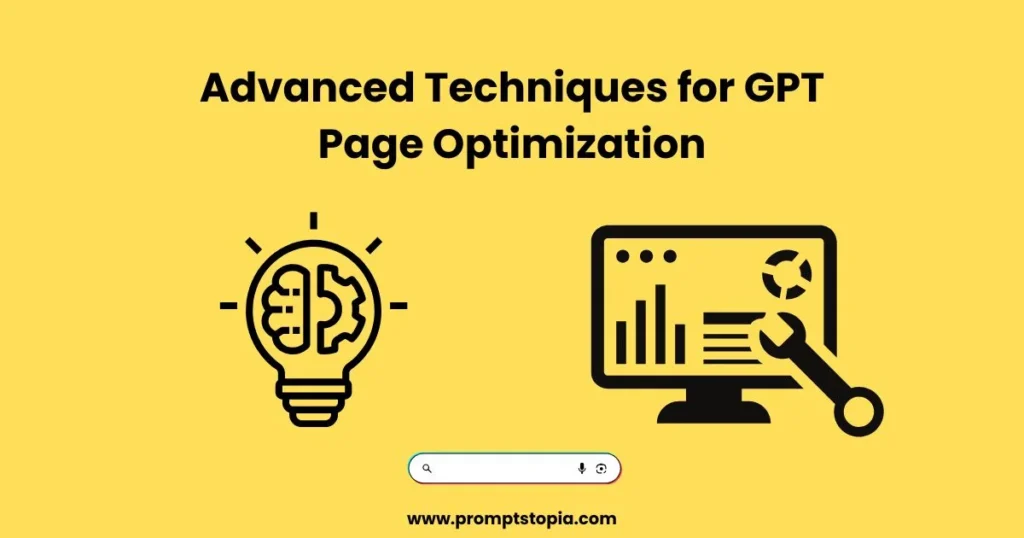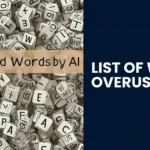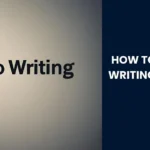In simple words, GPT page optimization is fine-tuning the AI-generated content based on the algorithms of a search engine to make the output readable and engaging with readers. It ensures content that comes from tools, like GPT models, is structured, relevant, and satisfies user as well as SEO expectations.
Table of Contents
- 1 Why is this important to the content creators and businesses?
- 2 Key Benefits of GPT Page Optimization
- 3 Foundational Steps for Effective GPT Page Optimization
- 4 Essential Techniques to Optimize GPT Pages
- 5 How to Maintain a Human Touch in Optimized Content
- 6 Common Mistakes to Avoid in GPT Page Optimization
- 7 Tools and Resources to Enhance GPT Page Optimization
- 8 Prompts for GPT Page Optimizations
- 9 Conclusion
- 10 FAQ’s
Why is this important to the content creators and businesses?
GPT pages Optimization means visibility and retention for the content creators and businesses. Because optimized GPT pages would mean high-quality and optimized content, which automatically fetches better search rankings, more attraction of audiences, higher engagement, and finally conversions.
Example: How Optimized Pages Are Different from Any Standard AI Output
Assume the same person writing a post on some topic with his AI tool that was without optimization. The resultant piece of output could contain pertinent content, but the problem is that unoptimized words may not hold the ability to have any structured text, flow, or meaning to search queries. That same content with the best GPT page optimization can form a smooth and readable content post that can rank appropriately and attract readers to you.
Many AI tools, including Jasper AI, Writesonic, and even ChatGPT, offer content creation and optimization services, which makes the whole process efficient and user-friendly. You can use these AI tools for content creation to make the whole process efficient and optimize user interference.
Key Benefits of GPT Page Optimization
These are some key benefits of GPT page optimization:
Improved Search Engine Ranking
GPT-optimized content increases the possibility of ranking it better in search engines and thereby increases the chances of the same being read by possible readers.
Enhanced Readability and User Engagement
Optimized content is clearer and better at holding the reader on the page for a longer time with increased possibilities of interaction with the page.
I once wrote a blog post using contents generated by GPT. Initially, it had some minimal traffic. Applying GPT page optimization strategies such as structuring heads and refining keywords helped drive the visibility of the same post significantly to a range of 50% viewed.
GPT Page Optimization and ChatGPT Hacks
The blend of GPT page optimization with ChatGPT’s productivity hacks, such as template development and automating mundane tasks, could make the content creation process easier and every piece more effective.
Foundational Steps for Effective GPT Page Optimization
These steps are very important for effective optimization; it will help you in finding and using keywords, creating an outline and arrangement of headings, etc.
How to Find and Implement Keyword Research Keywords
To discover the relevant keywords, firstly, use Ahrefs, SEMrush, or even Google Keyword Planner for this purpose. The choice of long-tail keywords is most effective where low competition is there with similar intent from the user side. Then keywords must be used in a natural, flowing train of thought while using headings, subheadings, and other pieces of content without overwhelming the page.
Arrangement of Content Clear Headings, Subheadings, and Logical Flow
A well-formatted article will enhance the reading and search engine optimization. Break the article into logical sections, creating headings and subheadings to lead readers and the search engine through key topics. An introduction with organized sections followed by a logical conclusion or summary would conclude the page. It’s one of the most important elements in GPT page optimization because it retains natural flow for content.
Outline Creating an Optimized Page via GPT-Generated Text
Start with your headlines on the main topics. Take the keywords you selected for your piece and place them in your H1 as the major topic of “ChatGPT productivity hacks.” Use H2s and H3s for the specific details about what that is, like “time-saving features” or “content drafts automation.” Place your keywords where they belong. Proofread and fine-tune to retain that human element while it’s well SEOed.
Preview your page
As a reader, make sure to preview your page every time. Make sure that it loads fast, is mobile-friendly, and looks clean. These are the basics you do in GPT for page optimization.
Essential Techniques to Optimize GPT Pages
Use your primary and secondary keywords organically within the content. Too much keyword usage can make the content feel forced and decrease readability. A good rule is to use keywords in the introduction, subheadings, and throughout the main body, but keep it conversational. This practice is fundamental in GPT page optimization for maintaining a balance between SEO and user experience.
Optimizing Meta Descriptions and Titles
Craft good meta titles with descriptions including your core keyword and having a clear call-to-action. A good title grabs people’s attention and makes them want to click. Descriptions are a summary; you can say what one could expect on the click, so make it short but impactful in keeping with best practice SEO.
Ensuring Mobile-Friendliness
Ensure your GPT-optimized pages are responsive and load well on mobile devices. More users browse on their phones, so mobile optimization is very important for keeping visitors and improving your page rank.
Personal Tip: Tricks I Use to Keep Optimization Straightforward
Breaking down the process into manageable chunks: first, content quality during drafting; then keyword placement and proper formatting during revision; lastly, checking for mobile compatibility. This structured process will help maintain clarity as well as ensure effective GPT page optimization.
How to Maintain a Human Touch in Optimized Content
Such content generated by optimized content will be engaging and not too robotic if one is able to blend personal voice with AI-generated text. It starts with a review of AI output and picking out where your expertise, anecdotes, or specific insights can add value. Such a blend ensures that readers feel the content was written more for them because it wasn’t too mechanical.
Applying Real Life Experiences to Make Content Warm and Relatable
For instance, suppose you were writing about productivity tips, GPT page optimization, etc. The inclusion of some personal story where optimizing contents led to increased traffic tends to be more relatable. This could be experienced through the simplest tweak when one’s headlines are more refined and hence increase an individual’s engagement. You tend to build trust for such experiences when you manage to make the reader connected to them.
Personal Insight: Balancing SEO needs and authentic storytelling
It is really crucial not to let the demands of SEO overshadow the personal voice. Use the right keywords, but do not substitute authenticity with rankings in search. I work mostly by writing the first draft as if I would try to explain the subject in a conversation with my best friend and adjust the text appropriately, including the keywords and improved structure. In the end, it is mainly how one can achieve optimal storytelling with optimization in it. A small addition of detail, like lessons learned or struggles, can fill up the content to make it more human-like.
Common Mistakes to Avoid in GPT Page Optimization
You need to avoid these mistakes at all costs, as these mistakes have a negative impact. Don’t depend too much on AI.
Keyword Stuffing and Its Negative Impact
Keyword stuffing is perhaps the most common mistake during the optimization of a GPT page. You end up with keywords stuffed in content, which would really make your content very awkward and also hard to read. Not only will this be bad for the user experience, but your search rankings will also degrade. You should focus on the placement of the keyword in your content organically rather than stuffing keywords.
Over-Reliance on AI Without Customization
The pages turn out generic and impersonal if you just use AI-generated content without customizing it. AI is extremely powerful, but human input makes the content richer and more relatable. Always customize your AI content to include a personal touch and keep to the ChatGPT best practices. This makes your content more engaging and credible.
Example
I optimized a blog post loaded with superfluous keywords. Only the search engines cared, and the change was just for them. Conclusion? It ranked poorly with high bounce rates. What I learned was that there’s a good balance between SEO and genuinely content-oriented writing.
Tools and Resources to Enhance GPT Page Optimization
Yoast SEO and Hemingway Editor help ensure that your text is search engine optimized but still readable.
Useful Platforms for Analyzing Page Speed and Mobile Optimization
Google, PageSpeed Insights, and GTmetrix are tools used in assessing the page load time and mobile-friendliness of your page. Such pages that load slow or do not respond could also lead to a bounce rate.
Personal Favorite Resources That Make Optimization Easier
I find the tools of Surfer SEO incredibly useful, with which one can perfectly and smoothly merge ChatGPT prompts for digital products without proper distribution of keywords. Optimization is easier using them; the content would remain of quality.
Prompts for GPT Page Optimizations
Prompt 1: Keyword Integration
“You are an expert in optimizing GPT webpages; your task is to write a detailed report regarding key metrics to measure after applying optimization strategies to GPT pages, focusing on tools for keyword rankings, page speed, and user engagement metrics. Then, analyze actionable recommendations to adjust the strategy based on performance indicators to continually improve content effectiveness.”
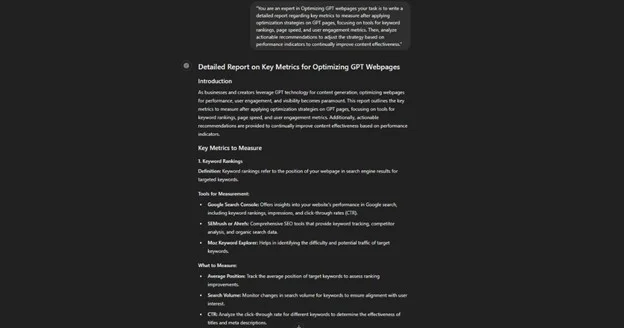
Prompt 2: Advanced SEO Techniques
” You are an expert in Optimizing GPT webpages your task is to design an advanced playbook on optimizing GPT pages beyond simple SEO steps. This could include schema markup, link building strategies, and optimization for voice search. Ensure that there are clear, practical examples of each as a way to increase visibility in search and improve overall user experience.”
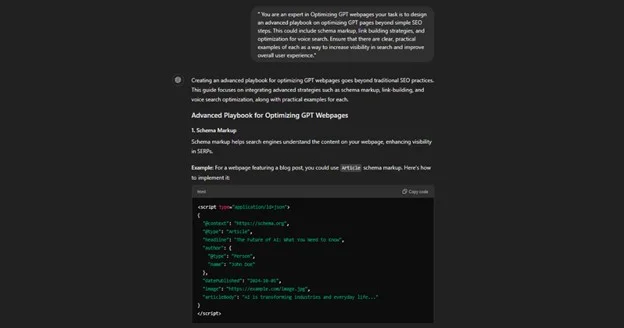
Prompt 3: Performance Analysis
“You are an expert in Optimizing GPT webpages your task is to write a detailed report regarding key metrics to measure after applying optimization strategies on GPT pages, focusing on tools for keyword rankings, page speed, and user engagement metrics. Then, analyze actionable recommendations to adjust the strategy based on performance indicators to continually improve content effectiveness.”
Prompt 4: Visual Optimization
“You are an expert in Optimizing GPT webpages your task is to create a walkthrough on optimizing visuals in content for GPT page optimization. In this walkthrough cover the use of relevant images, alt text for the purpose of SEO, ensure images are optimized to have fast loading times. A balance of text to elements visually will engage and is clearer.”
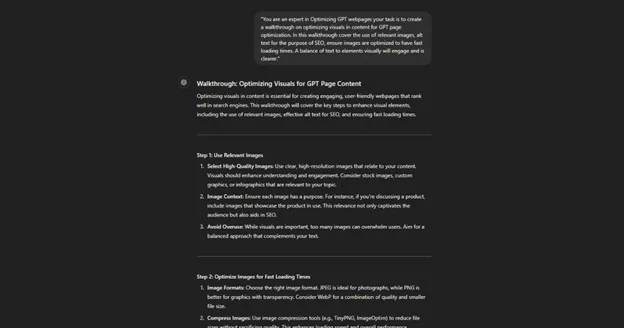
Conclusion
We discussed the importance of GPT Page Optimization on the aspects of mobile responsiveness, caching, and effective API calls. Along with this, we also discussed a few useful real-world optimization tips and learned from a few successful case studies on the real-world benefits behind these approaches.
Prospects for improving the performance of the website and optimization with GPT are optimistic. Improved models and tools will be applied to improve user experience as well as reduce the time taken to load while technology advances with AI. From it, more personalization of online interactions will be followed, and the strategy of optimization will differ between a competitive business from others that may lose its lead.
FAQ’s
Most of the ChatGPT plugins are free, but you need a paid ChatGPT subscription to use them. You can get both GPT-4 and its plugins with the Plus subscription from ChatGPT.
Your material should be original and organic, contain proper keywords, meet the users’ search intent, and be search engine friendly. Your webpage will most probably fail to rank if it lacks all of these factors. Of course, there always are exceptions, such as when your site’s DA is really high, but still, these exceptions seem to be quite rare:

